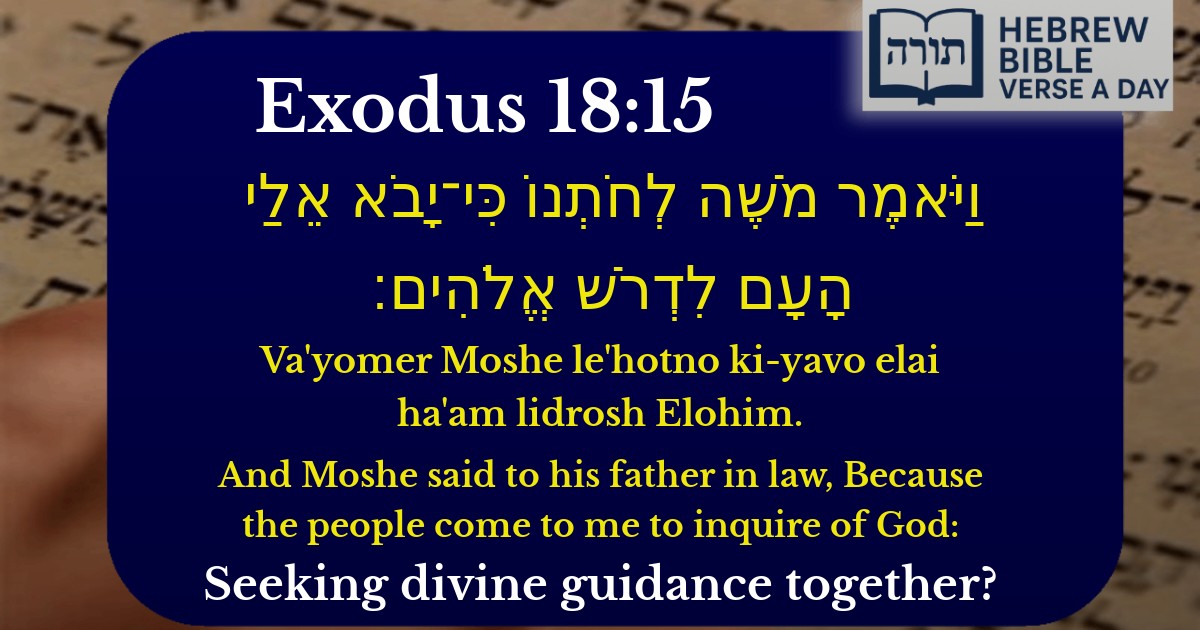Join Our Newsletter To Be Informed When New Videos Are Posted
Join the thousands of fellow Studends who rely on our videos to learn how to read the bible in Hebrew for free!
Hebrew Text
וַיֹּאמֶר מֹשֶׁה לְחֹתְנוֹ כִּי־יָבֹא אֵלַי הָעָם לִדְרֹשׁ אֱלֹהִים׃
English Translation
And Moshe said to his father in law, Because the people come to me to inquire of God:
Transliteration
Va'yomer Moshe le'hotno ki-yavo elai ha'am lidrosh Elohim.
Hebrew Leining Text
וַיֹּ֥אמֶר מֹשֶׁ֖ה לְחֹתְנ֑וֹ כִּֽי־יָבֹ֥א אֵלַ֛י הָעָ֖ם לִדְרֹ֥שׁ אֱלֹהִֽים׃
וַיֹּ֥אמֶר מֹשֶׁ֖ה לְחֹתְנ֑וֹ כִּֽי־יָבֹ֥א אֵלַ֛י הָעָ֖ם לִדְרֹ֥שׁ אֱלֹהִֽים׃
🎵 Listen to leining
Parasha Commentary
📚 Talmud Citations
This verse is quoted in the Talmud.
📖 Yevamot 105b
The verse is referenced in a discussion about the importance of seeking divine guidance and the role of leaders in providing spiritual counsel.
📖 Sanhedrin 6b
The verse is cited in the context of discussing the responsibilities of judges and leaders to provide guidance and judgment to the people.


Context in the Torah
The verse (Shemot 18:15) appears in the narrative where Yitro (Moshe's father-in-law) observes Moshe judging the people from morning until evening. Moshe explains that the people come to him "to inquire of God" (לִדְרֹשׁ אֱלֹהִים), seeking divine guidance in their disputes and questions of law.
Rashi's Explanation
Rashi comments that "to inquire of God" refers to seeking rulings on matters of halacha (Jewish law). He emphasizes that Moshe served as the sole authority for transmitting Hashem's will to the people, as the Torah had not yet been fully given at this point in the narrative. Rashi further notes that the people came to Moshe for both minor and major disputes, indicating their complete reliance on his prophetic connection to Hashem.
Ibn Ezra's Perspective
Ibn Ezra explains that Moshe's role was unique because he had direct access to divine communication. The phrase "to inquire of God" implies that Moshe would bring their questions before Hashem and return with answers, distinguishing his judgeship from later systems where halachic decisions would be made through human scholarship and the Sanhedrin.
Rambam's Halachic Insight
In Hilchot Sanhedrin (1:1), Rambam derives from this verse that the ideal system of Jewish jurisprudence requires learned judges who can properly determine halacha. While Moshe's direct prophetic connection was unique, the principle remains that qualified Torah scholars must be accessible to the people for proper guidance in divine service.
Midrashic Interpretation
Chassidic Perspective
The Sefat Emet explains that Moshe served as the channel connecting heaven and earth. The people's coming "to inquire of God" through Moshe represents the Jewish soul's eternal yearning to connect with the Divine through Torah. This sets the paradigm for all future Torah study and halachic decision-making.